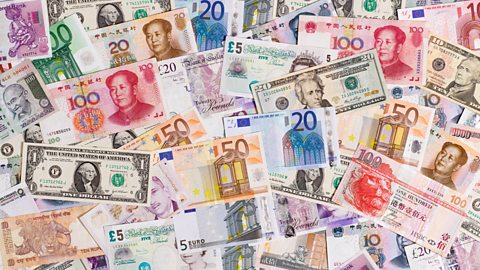Any person involved in travel, business or investing should be aware of the distinction between local and online currency exchange rates. Local rates are exchange rates which you can find at currency exchange outlets in physical locations, banks, and ATMs close to your residence or location. Online rates are provided through digital platforms and financial institutions to exchange currencies. They can be wildly different, which affects the amount you will pay to exchange money as well as the value of your investment. If you are aware of the differences between the rates of exchange in both online and local markets, you will be able to make better financial decisions. These are the 10 most important tips for successfully navigating both online and local prices.
1. Understanding the differences in rates
Local exchange rates may differ considerably from online rates due to factors like overhead costs, demand and market conditions. Local exchange services could have more fees and lower rates because of operational expenses, whereas online platforms often provide better rates due to less overhead. Knowing the differences will allow you to choose the best solution for your needs in exchange of currency.
2. Compare rates before you exchange currencies.
Compare the rates of the local and online currency exchanges before making a decision. Make use of reliable currency converter tools and websites to verify real-time rates. Compare the exchange rate online with the local exchange rate at booths and banks when you are planning to travel internationally. This comparison can help you find the most cost-effective solution and save money.
3. Utilize Online Currency Exchange Platforms
Online currency exchange platforms like Wise (formerly TransferWise), and copyright typically offer lower rates and costs as compared to local banks and kiosks. These platforms usually offer live exchange rates as well as the ability to disclose the fees. With these platforms, you can be sure that you're getting the most value on currency conversion.
4. Be Aware of Dynamic Currency Conversion (DCC)
When you make purchases outside of the country there is the option of paying in the currency you use at home through Dynamic Currency Conversion. Although it can be useful however, it can result in an poor exchange rates and extra charges. Choose to pay with the local currency in order to avoid the excessive charges of DCC and benefit from lower rates.
5. Cost isn't the only factor to consider. Consider Convenience vs.
When choosing between local rates as well as the online rate, you must weigh convenience against costs. Local exchanges might provide quick access to cash when you are traveling. Online exchanges have cheaper rates, but they need the establishment of an account and wait for the transfer of funds. Determine which option best suits your needs by assessing your travel plans or transactions.
6. Track Exchange Rate Trends
Monitoring the trends in exchange rates can help you make informed decisions about when to convert your currency. Online platforms are often equipped with historical data or analysis tools that allow you to track the fluctuation of exchange rates. Understanding market trends will aid you in determining the best time to make currency conversions, whether on the internet or locally, in order to get the most favorable rates.
7. Compare ATM fees and local withdrawal limit
You may have to pay fees if you opt to withdraw money locally from an ATM. Different banks can charge different fees for international transactions and ATMs usually have their own withdrawal limits. Before you travel, do some research on local ATMs to make sure you receive the best rate and lowest fees.
8. Search for no-cost Currency Exchange Services
Some platforms on the internet offer free exchange of currency, especially for users with accounts. This can be especially useful for businesses or frequent travelers who frequently exchange foreign currency. Setting up an account can allow customers to take advantage of lower rates and a better service, which can help maximize your cost savings.
9. Get financial advice from experts when it comes to major transactions
If you have to deal with huge amounts of money, or exchanges that are complicated seeking advice from financial specialists can be very useful. Currency experts can provide valuable advice regarding the best methods to use local and internet rates. This is crucial for those involved in international trade or those who want to maximize their exposure to foreign exchange.
10. Plan Ahead for Currency Needs
When you're planning an official trip or travelling, planning your currency requirements in advance can save you time as well as money. Determine how much you'll require for your trip, and then decide the best exchange rate. Consider using online platforms before your trip to exchange currency if you find the local rates are not favorable. This will guarantee you get better rates, and minimize the chance of losing cash due to undesirable transactions.
Follow these tips to help you navigate the complexities of currency exchange, whether you're traveling, conducting business, or tracking your investments. Knowing the advantages and disadvantages of each will enable you to make the right financial choices in line with your objectives, saving you money. Have a look at the most popular here are the findings on us for more recommendations including baht to usd, rmb to usd, pound to usd, us to peso, convert euro to usd, currency converter, dollar to rupee, usd to euro exchange rate, cdn to usd, yen to usd and more.

Tips On How To Make Payments In The Currency You Prefer.
In today's world-wide economy, it's vital to select the most suitable method of payment to efficiently manage your financial transactions, whether traveling abroad, managing the business or monitoring investments. Costs, convenience, as well as security can be affected by the method of payment you choose. Different payment methods come with various fees, exchange rates and acceptance levels, that can impact the overall experience as well as the financial outcomes. Knowing the subtleties and distinctions of payment methods will assist you in making choices that are aligned with your business goals. Here are the top ten crucial tips for selecting the right payment method for your financial goals.
1. Find out about the various payment options that are available
Be familiar with available payment methods including cash, credit/debit cards mobile payments, digital wallets. Each type of payment has advantages and disadvantages in terms of acceptance, convenience, and charges. Cash, for instance, is generally accepted however it can be a hassle and less secure when used to purchase large amounts of goods. Knowing the pros and cons of each one will help you choose the best option to suit your needs.
2. Charges for Currency Conversion
You may have to pay currency conversion fees when you use your credit or debit card to make international transactions. Banks and credit card providers may charge different charges. Certain cards have an international transaction fee while others do. Contact your credit card provider or bank prior to travelling overseas or purchasing items to determine their policies about charges for currency conversion. Pick cards that reduce the costs associated with these transactions.
3. Use credit cards with no fees for foreign transactions
If you're planning to travel internationally or make purchases in foreign currencies select the credit card that does not charge any fees for transactions in foreign currencies. Many credit cards aimed at travellers offer this benefit. It lets you make purchases abroad without incurring charges. This can be a significant saving, particularly for frequent travellers or who are making significant purchases on foreign markets.
4. Utilize mobile phone alternatives
Mobile payment options, such as Apple Pay, Google Pay and a variety of other digital wallets offer an easy way to conduct transactions without having to carry credit or cash. These services often offer enhanced security features, such as biometric and tokenization, making them a safe option for both in-person and online transactions. If you're looking to lower your expenses, you should consider mobile payment options, especially for small purchases.
5. Pay attention to ATM fees when withdrawing money
If you're on the road and need to withdraw money, be aware of ATM fees. These can vary widely. Some banks charge withdrawal fees for international transactions, whereas some may partner with other local banks to waive withdrawal fees. Investigating ATM networks that offer less fees can help save money when you withdraw cash abroad. Also, withdrawing large amounts simultaneously can help minimize fees and transactions.
6. Make sure you have backup payment options
A backup payment method can help you avoid any disruptions if your primary payment method does not work or is lost. To ensure that you can still buy items, keep another card or debit cash, mobile, or payment options. When traveling, this redundancy is even more crucial since some locations do not accept all payment methods. If you are prepared you'll be able to handle any unexpected events better.
7. Monitor Exchange rates for better decisions
If you're planning to make purchases in foreign currencies, keep an eye on the exchange rates to ensure that you are able to make an informed choice about whether or not to convert your currency. You can identify the best conditions for currency exchange by making use of tools and programs that monitor real-time rates. This could affect the payment method you choose particularly if there are fees connected with conversions of currency.
8. Make sure you are aware of security measures
Security should always be considered when selecting the payment method. Check the security measures offered by your credit card or bank provider. Look for fraud protection features including transaction alerts, transaction monitoring and encryption technology. Choosing secure payment options will safeguard you from fraudulent or unauthorised transactions.
Reviewing Payment Policies for Business
Understanding payment policies will assist you in managing your cash flow. Examine the various payment processors, their features fees, acceptance rates and features. Choose a payment method that aligns with your goals for business, regardless of whether you value low transaction fees, quick processing times or convenience. A properly-chosen payment method can increase customer satisfaction and speed up your processes.
10. Find out about the methods of investment payments
Understanding the payment method is crucial for investors. Different brokerage platforms have various payment options for opening an account or making trades. Be aware of the processing time and charges that are associated with each method. Also, think about how margin accounts or leveraged investments could impact your financial plan.
Following these detailed tips for payment options can help you navigate the many complexities of travelling, conducting business and managing your investments. Understanding your options, fees and security features will help you make better financial decisions. The best method of payment will enhance your financial experience overall give you security and peace of mind, as well as help save money. Read the top rated euro tips for blog advice including currency exchange near me, usd to pound sterling, us to peso, euro to dollar, dollar to euro, us dollar to pakistani rupee, eur to usd, pesos to dollars, aud to usd, convert pounds to dollars and more.
